Black Economic Unity Is A Must For Black Survival, Say N.C. Conference Presenters And Business Leaders
By Eric Ture Muhammad -Contributing Writer- | Last updated: Jun 1, 2016 - 9:05:24 AMWhat's your opinion on this article?
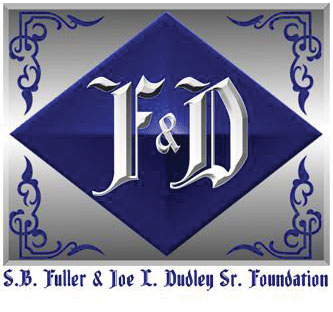
|
This approach isn’t optional but mandatory if Blacks are to rise out of an economic desert and income instability, they added. It means more hiring within the community, creation of businesses that could be financially healthy and produce endeavors that could mean healthier foods and lifestyles, and provide a solid economic foundation can help strengthen families that find themselves on edge, the presenters said.
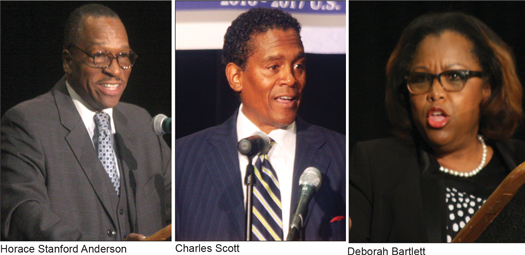
Photos: Andrea Muhammad
|
“Capitalism … the only true pathway to freedom” was the theme of this year’s special gathering of the S.B. Fuller & Joe L. Dudley Mastermind Business Group Meeting at the Benton Convention Hall on May 21. It brought together business and investment experts from across the U.S. and Bahamas, offering their take on how Black spending habits, and the Black ability to generate revenue must be strategically used to help a suffering people survive.
Less focus on individual attainment and development of a collaborative economic framework would rebuild Black neighborhoods, while increasing peace, security, kinship and an overall sense of connection, they argued.
“African-Americans are at a pivotal point in our history,” said networking mogul Dr. George Fraser of FraserNet. “And the world is not waiting for us to wake up to our power,” he said, pointing to the Black community’s economic welcome mat policy. This unwritten standard allows anyone who is not Black easy access to Black dollars and consumers, anyone else can walk in, meet some community needs, wipe their feet on consumers like a doormat and exit with tens of millions of dollars put in banks outside of the community, presenters said.
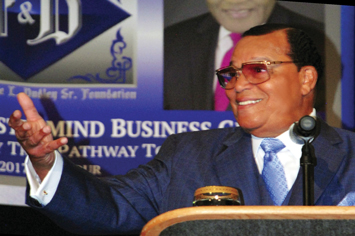
Photo: Richard B. Muhammad
|
According to the U.S. Census, by end of the year 2016, a projected $1.1 trillion to $1.3 trillion will pass through Black hands. In less than six hours, Black dollars find their way out of the community because of too little interaction between Black-owned businesses and Black spenders, observed the Honorable Minister Louis Farrakhan of the Nation of Islam in remarks during the Mastermind Group session.
“I am honored to stand before almost a thousand entrepreneurs that really are the backbone of the economic development and salvation of our people,” he said. “The enemy has never wanted to see us economically powerful. And every effort that we have made to become economically strong, the architect of that economic strength, was always labeled anti-Semitic.”
“Booker T. Washington, wanted us to be economically free. The great Marcus Garvey came from Jamaica to meet Mr. Washington. He so admired Booker T. Washington,” the Minister noted.
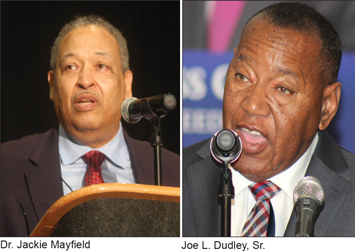
Photo: Hassan Muhammad
|
Mr. Garvey contacted Mr. Washington between 1914–1915 with plans to visit him and discuss the formation of a school in Jamaica based on the Tuskegee model. But Mr. Washington died four months before Mr. Garvey arrived in the United States.
“All of us are standing on the shoulders of somebody else,” Min. Farrakhan said. “And none of us will live long enough to completely solve the problem. But each of us in our time has a function to perform and a mission bigger than being an entrepreneur. That’s the start of it. But what is the mission of the entrepreneur? It is not just to make money to fatten the pocket of an individual or a family. But the entrepreneur is the bell weather. They are the ones who signal to the people we are present to supply our people’s needs,” the Minister said.
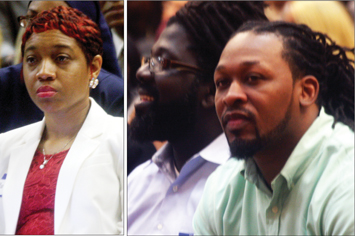
Photos: Andrea Muhammad
|
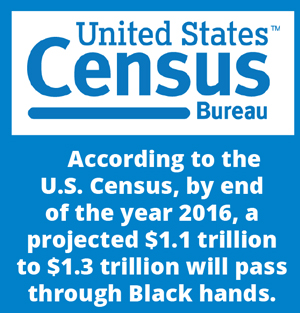
|
According to Korean Daily and its analysis of the U.S. Korean Market, Korean Americans hold the second-largest share of immigrant business ownership, with more than 90,000 Korean entrepreneurs owning 158,000 businesses across the U.S.: Thirty-two percent are white-collar professionals 15 percent are small to medium size business owners, the report noted. Of the more than $500 billion Asian Americans spend annually, Korean Americans account for close to $40 billion of that total. Circulating the money amongst themselves has increased their U.S. buying power since 2000 by more than 71 percent. Their median household income is an estimated $50,565 per year. Though their preferred residences are found mostly in metropolitan areas, they primarily dedicate their earnings to building community strength. They use community savings institutions and some estimate money circulates more than 30 times among their food markets, schools, retail stores, pharmacies, fabric and clothing stores.
According to the Korean Daily study, more than78 percent of Korean Americans, speak Korean daily. There is a lot to study in their model of success, the panelists suggested.
“God sent us here, on this earth as one of the greatest species ever created by God and he was so pleased with the creation that he allowed other nations to borrow from us,” stated Dr. Jackie Mayfield, founder of Corprotax, the largest Black-owned tax service for entrepreneurs with more than 220 franchises across the United States. “And now, we are the fathers and mothers of great people in the world that now, we as the fathers and mothers, are lacking a spirit of understanding of who we are. Too often, we go into business with an employee mindset and want to be a good business person. Those are two different mindsets. There are other nations; there are other groups of people in this world that teach their children from birth to be in business and to support your family while they’re in business so that they can be successful,” he said.
“How do we expect our communities to be rich, if we are constantly taking the money and giving it to someone else? We feed our enemies—we feed them with our money and expect of them to do good by us. They are going to do good for themselves. And that is right to do,” he said.
“It is wrong for us not to do good for ourselves. Your community’s culture is like having good, rich soil so that you can grow human beings into self-determined people that will produce other self-determined people to sustain your cultural identity. It is necessary for your cultural DNA to be healthy so that people placed in that culture will not only survive but will provide. It is impossible to have a healthy cultural DNA without having an understanding of the role that Africa played in establishing civilizations around the world, before it was colonized,” said Dr. Mayfield.
“We have to have some sense of our ancestral mothers and fathers” to correct the cultural imbalance in our handling business, he added. “It’s a question now of mental slavery. How do we repair ourselves to survive?”
“Colonialism limits our freedom,” said Deborah Bartlett, founder and creator of Bartlett Communications (BMC) and Gems New Media Network, Nassau, Bahamas. “We must demonstrate the first step that we have to take to shift the paradigm and break free from the slave mentality; that is to break free from the spirit of familiarity and celebrate those who shed their blood down on this earth” to liberate Blacks economically, she stressed. “Greatness lives in three tenses. The past, the present and the future,” she continued drawing parallels between the lives of Madame C.J. Walker, the first Black millionaire S.B. Fuller, who was a millionaire and businessman during segregation and his disciple Dr. Joe L. Dudley, Sr., another Black business stalwart. All three made money in the Black hair care industry.
“Dr. Joe Dudley Sr., is the bridge between the past and the present and the future. He is a visionary leader and one of the divinely delivered channels for economic empowerment and economic opportunities for today and tomorrow,” Ms. Bartlett said.
Each panelist noted the accomplishments of the Most Honorable Elijah Muhammad and his approach to building a more than $80 million dollar empire through cooperative businesses, trade and commerce, schools, farms, transportation and a news organ, The Muhammad Speaks newspaper.
Mr. Fuller and the Hon. Elijah Muhammad would grow to be contemporaries. Both lived in Chicago and built similar models of not only self-sufficiency, but would go on to develop disciples of their disciplines who would teach their models of success. Hence, Joe L. Dudley, Sr., and the Honorable Minister Louis Farrakhan have rebuilt the work of their teachers.
“My first task was to go door to door,” recalled Emilio Antonio “Tony” Guevara, foundation president and organizer of the conference weekend. “I knocked on 723 homes. He (Mr. Dudley) told me to count the homes. He was teaching me the process of A, B and C customers and I categorized them,” making a community in Greensboro, N.C., my customer base, he said.
Mr. Guevara, along with his foundation work, is president and CEO of Enyada LLC., which serves the beauty industry through his Enyada Graduate School of Cosmetology, in Charlotte, N.C.
At his teacher’s request, Mr. Dudley moved to Chicago, Ill., to spearhead Fuller Products in 1976. The company consolidated operations in 1980 under the Dudley Products brand name. Moving back to Greensboro in 1984, the company has boasted annual revenues of $30 million with more than 400 hair and skin care products, the Dudley Cosmetology University, with locations in North Carolina and two schools reportedly in the African nation of Zimbabwe.
Mr. Dudley and his company were featured in the Chris Rock 2009 documentary “Good Hair,” and is one of a few Black-owned companies still manufacturing hair products for the Black community. The S.B. Fuller and Joe L. Dudley Mastermind Business Group Meeting holds weekly meetings in the home of Mr. Dudley in Kernersville, N.C. The meetings began with S.B. Fuller 80 years ago.
Mr. Guevara and supporters plan to tour the country to raise money for the museum and to continue to encourage and support entrepreneurship. The weekend included classes in business development and business strategy.
“According to the United States Census Bureau, there are more than 2 million businesses in the country that are owned by African Americans. More than 94 percent of these businesses are made up of sole proprietorships or partnerships which have no paid employees. Nearly 4 in 10 Black-owned businesses (more than 700,000) in 2007 operated in the health care, social assistance; and other services such as repair, maintenance, personal and laundry services sectors,” according to the online Black PR Wire Black Resource Directory.
“Despite the increase in the number of Black firms, Black-owned businesses only make up 7 percent of all U.S. firms and less than a half percent of all U.S. business receipts. African American adults (ages 10 and up) make up 10 percent of the adult population and are therefore underrepresented in the U.S. in terms of business ownership—especially when it comes to earnings,” the resource guide reported.
INSIDE STORIES AND REVIEWS
-
-
About Harriett ... and the Negro Hollywood Road Show
By Rabiah Muhammad, Guest Columnist » Full Story -
Skepticism greets Jay-Z, NFL talk of inspiring change
By Bryan 18X Crawford and Richard B. Muhammad The Final Call Newspaper @TheFinalCall » Full Story -
The painful problem of Black girls and suicide
By Charlene Muhammad -National Correspondent- » Full Story -
Exploitation of Innocence - Report: Perceptions, policies hurting Black girls
By Charlene Muhammad -National Correspondent- » Full Story -
Big Ballin: Big ideas fuel a father’s Big Baller Brand and brash business sense
By Bryan Crawford -Contributing Writer- » Full Story






 Click Here Stay Connected!
Click Here Stay Connected!








